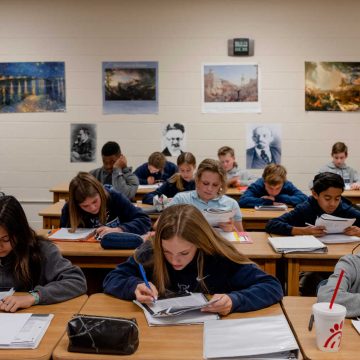A career in education can be rewarding for those who value learning and its benefits. The main area of work is teaching and lecturing, but there are other jobs, such as administration. All roles in education require a commitment to learners, working well in a team, and excellent communication and organization skills.
Education is how society passes on knowledge, skills, customs, and values to a new generation. The education sector comprises schools, colleges, universities, and private institutions. It is responsible for skilling the current workforce and preparing young people for work and life.
Exeter University delivers the MA education online for educators interested in leadership and management in the education sector. A rich curriculum examines theory, research, policy, and practice in education globally.
Teaching
There are strengths and characteristics needed to be suited to teaching. Teachers need to have academic ability and are required to have a degree. Teachers for younger children will need to cover a wide range of subjects, so they must be able to teach English, math, and science. Teachers for older children must have a passion for their subjects. A lot of administrative work is involved in teaching, including planning lessons, so teachers need good organizational skills.
Excellent communication skills are essential for teachers. They need to give compelling lessons and interact meaningfully with their pupils. Teachers also build relationships with colleagues and the children’s parents. Written communication is also important for writing reports on pupils’ progress.
Teachers should have the desire to help children learn and reach their potential. Teaching is a demanding job, so energy and stamina are essential characteristics. Teachers deal with challenging behavior, keeping up with marking and paperwork, and safeguarding pupils. However, they are well supported and can have a positive influence on the lives of children.
Teachers need to have self-awareness and review their lessons so they can constantly improve and keep on learning how to teach well, and this means the work is an ongoing challenge. The teaching profession deals with regular change, so teachers must be willing to adapt and commit to continuous professional development.
National Teacher of the Year
Kurt Russell is an example of someone ideally suited to teaching and uses his skills to motivate his students to learn. In 2022 he was named National Teacher of the Year in America. When he won the award, one of his students said: “Mr. Russell always strives for every student to succeed in his classroom”.
Russell teaches at the high school he attended and has wanted to be a teacher since kindergarten.
He has been a teacher for 25 years and teaches courses like US history and African American History. He is also the school basketball coach and the faculty advisor to the Black Student Union.
Russell is black and hopes to use his platform to advocate for a culturally responsive curriculum and a more diverse teaching profession. Only 20 percent of teachers are teachers of color, and just 2 percent of teachers are black men.
Russell said: “This is a country that is made up of so many great different individuals, so many different cultures and races and religions. And what I try to bring into my classroom are those different aspects—making sure that the narratives of others are being told through stories.”
Administration
For people who are interested in working in education but not as a teacher, there are a number of other roles. Educational administrators manage the daily operations of a school. Their work can be on admissions, quality assurance, data management, finance, marketing, or human resources. They must work well in a team and liaise with other staff. They also interact with students, parents, and people from the local community.
Education administrators need strong leadership skills to influence students and teachers and make changes. They need to solve problems as they arise and make good decisions quickly. They are expected to have business knowledge and the ability to manage finances. They create the school budget and timetables. Administrators need excellent organizational skills to handle many duties and priorities and run the school’s daily operations efficiently.
Some professionals progress to become school business managers. Education administrators typically need at least a bachelor’s degree.
Education welfare officer
This role can suit someone who strongly believes in education and can demonstrate a firm but non-judgmental manner. When children are often absent from school, they are referred to the education welfare officer, who ensures they attend school and get the support they need.
There are many reasons why children might miss school, including school phobia, bullying, and problems at home. Children who miss school often come from disadvantaged homes. The welfare officer will interact with pupils and parents and arrange education for excluded pupils . Welfare officers need counseling skills, patience, and to stay calm in stressful situations. Although the work is sometimes difficult, it can be rewarding for the right person.
It is possible to get experience by starting as a welfare officer assistant. There are no set requirements for this role.
Educational psychologist
Educational psychologists must have analytical skills and the ability to work under pressure, manage a caseload, and prioritize the work. They work as part of a multidisciplinary team working closely with teachers. They provide training for teachers and teaching assistants, and they do research and advise on educational resources and policies.
Educational psychologists develop interventions and strategies to help the child and do collaborative work with teachers or parents. The work can include supporting children with learning difficulties, communication needs, or social and emotional problems. This role can be challenging as it involves working with children having difficulties, but it can be rewarding when they progress.
Educational psychologists usually have a degree in psychology, although graduates in other subjects can do a master’s conversion course. After getting experience working with children in an educational setting, they can apply to a post-graduate course such as a doctorate in educational psychology.
















